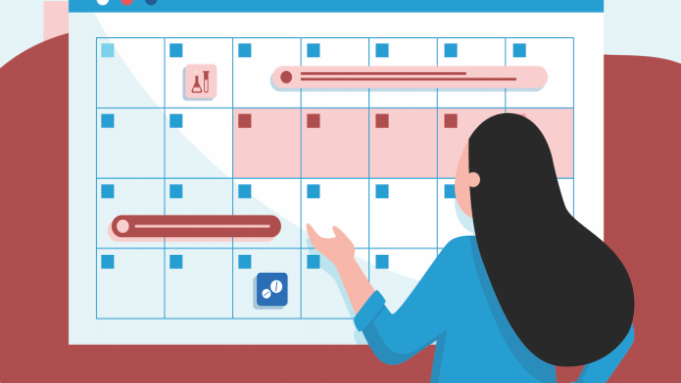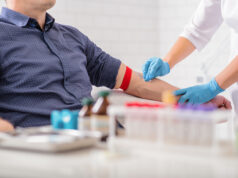Not only is there a lot going on in the world, but we still have our period every month. Our bodies as menstruators don’t stop their cycle and it’s important to think about how these uncertain times might affect us psychologically and physically.
First, it’s important to understand our Cycles
There are four phases of the menstrual cycle, it starts on the first day of your period and then ends when your next period begins. This whole cycle takes between 24 to 38 days on average and varies from menstruator to menstruator. There can be all kinds of changes that happen to a woman’s body during that time, in particular during PMS (premenstrual syndrome).
Phase 1: Menstruation
The first phase of your menstrual cycle is menstruation. We all know what this is, the extra lining of your uterus exiting your vagina. And this phase of your cycle lasts between three days to a week for most women.
Phase 2: Follicular
The second phase of your menstrual cycle is the follicular, or pre-ovulatory, phase. This phase may feel a little less pronounced than the others, it’s around Days 6-10 of your 28 day cycle. It starts on the first day of menstruation and ends at the start of the ovulation phase.
What is happening is prompted by the hypothalamus; the pituitary gland releases a follicle-stimulating hormone. This hormone then stimulates the ovary to produce around 10 follicles which each house an immature egg. Usually, only one follicle will mature into an egg, which stimulates the lining of the uterus to thicken in preparation for the possibility of pregnancy.
Phase 3: Ovulation
Ovulation is the third phase in the cycle that happens around two weeks before menstruation starts. The previous phase (follicular) causes a rise of estrogen levels and the brain recognizes that these levels are thus rising and releases a hormone called gonadotrophin. This hormone then prompts the pituitary gland to make higher levels of luteinizing hormone (LH). All of this is all in order to trigger ovulation by the high levels of LH.
During ovulation, the egg is pushed into the fallopian tube towards the uterus and the egg will typically last 24 hours. Unless it meets sperm, the egg will die. This is why ovulation is known as the “fertile window” during your cycle.
Phase 4: Luteal Phase
The Luteal phase is the final phase in the menstrual cycle and occurs around day 22 in a 28 day cycle. The egg has busted away from the follicle during the ovulation phase, but the follicle is still in the ovary and starts releasing estrogen and progesterone, creating the thickening of the lining of the uterus, which then is shed during menstruation.
So When Does PMS Occur?
PMS occurs on Day 14 of the menstrual cycle and can last for a week and affects 90% of menstruators in their lifetimes, so know that you’re not alone.
What exactly is PMS?
Premenstrual Syndrome is a condition that affects menstruators the week before their period that can affect the body with physical symptoms such as cramps and headaches, as well as the mental health effects like anxiety, stress, irritability and gloominess.
So What Can You Do to Help Treat Your PMS?
In two clinical trials, a new PMS supplement for mood swings showed that it helped 80% of women regulate their PMS mood swings, including anxiety and stress. And the supplement contains only two ingredients Oxaloacetate (found in the Krebs Cycle) and Vitamin C, so you know exactly what you’re putting in your body.
Scientific studies show that during PMS women with severe PMS mood symptoms send much larger amounts of glucose to a specific area of the brain, the cerebellum.
If there is not enough glucose (energy), the cerebellum can’t properly perform important functions like mood regulation, managing fear, pleasure responses, and motor control. This leads to the four core mood symptoms of PMS: anxiety, gloominess, stress, and irritability. You may have experienced these same mood alterations outside of PMS when you are hungry.
By taking this Oxaloacetate Supplement for PMS, it is helping to manage the glucose levels in the brain, so those ups and downs are more of a wave, and consequently the stress is much more manageable.
Oxaloacetate for PMS is the new solution for helping to manage those PMS mood swings, thereby allowing you to actually say that you’re doing well and feeling great.
There are so many external pressures and problems in the world right now, but you no longer need to stress. Jubilance for PMS (www.Jubilance.com) was clinically formulated to help you regulate your mood swings and feel like your best self every day of the month.
Jubilance for PMS is the destressor you’ve been waiting for, it’s time to start managing your mood swings and then you can say goodbye to the stress of your menstrual cycle.
Try Jubilance for PMS today to help stop those mood swings in their tracks. You can get Jubilance for your first trial bottle for only $19.95! There’s no reason not to try it! Here is the link for your trial bottle!












